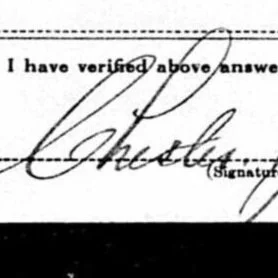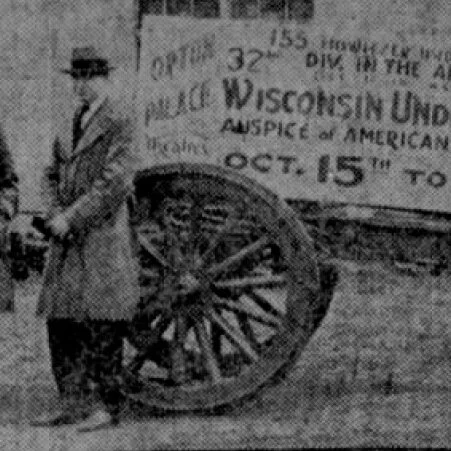Ten Nights in A Bar Room
In 1931 Leon Goetz was on the lookout for new investment opportunities. In the late 1920s he and his brother Chester had tried to break into the Milwaukee movie theater scene, but these investments failed due to oversupply in Milwaukee’s urban center. After this catastrophe, it appears that the brothers began to drift apart. Leon turned to Chicago’s movie industry and tried his hand at wielding a fire that had burned him a decade before: temperance politics.
One of the local groups most opposed to Leon’s movie offerings in Monroe was the local temperance society, which was lead by prominent area women. As a group these women were literate; had some disposable income; and as farm- and house-wives, they were masters of their own time. This allowed them to be politically active in ways that their grand-daughters, born after 1970s-era feminism, would never have the time nor resources to be. These women organized alongside law enforcement and the local Ministerial Association (which presumably did not include the Universalist minister!) to keep pornography, and the social costs that come with it, out of their community. Monroe residents overwhelmingly supported them.
While Leon had initially been brash in the face of these activists’ requests that he at least respect the Blue Laws which prohibited Sabbath film showings, he quickly realized that this was a battle he would not win. Leon must have been a bit awe-struck by these ladies, because when he decided to produce his own movie in 1931 he chose to pander to their tastes, rather than to fight against them. The result was “Ten Nights in a Bar Room.”
My synopsis: A sickly young girl tries to stop her alcoholic father’s drinking and gambling at the local tavern and is unintentionally gravely injured during a bar fight. Her father, having gambled away his mill and likely lost his daughter, kills the bar owner in another fight and unintentionally burns down the tavern.
This story was adapted from an 1854 book by American author Timothy Shay Arthur titled Ten Nights in a Bar-room and What I Saw There . Shay examined the social and political costs of alcoholism, including political corruption financed by the liquor trade and associated organized crime— Leon’s adaptation does not touch on these more dangerous subjects, although “speakeasies” and the political corruption accompanying bootlegging were serious contemporary problems. According to the American Film Institute’s catalog, this story had been adapted for film five times prior to Leon’s version.
Ten Nights in a Bar-Room poster, 1931. Image courtesy of Wikipedia.
“Ten Nights in a Bar Room” was directed by William O'Connor and premiered in New York City on February 27th, 1931. The production company was “Roadshow Production, Inc.”, of which Leon Goetz was the president. The producers were Willis Kent and Howard G. Underwood; Underwood also owned world rights to the film— we met him before as a business partner of the US military-connected sexologist Albert Dezel. The distribution company was named “State Rights”. Kent owned the copyright to the film, which was filed on September 5th, 1930 and holds number LP1592.
As readers can see from the black-red-white poster, Leon Goetz was also billed as a “presenter” of the film; IMBD lists him as a “re-release presenter” and an “editorial supervisor”. However, Leon seems to have been playing a game larger than any of these roles suggest. Here is a March 4th 1931 Variety review of the film which discusses Leon’s made-to-measure temperance society: (a transcription of the relevant text follows the image below)
Variety, March 4th 1931.
TRANSCRIPTION: “Ten Nights in a Bar-Room” as a talker must rank as a propaganda picture.
This is regardless of anything or everything else in it. A prolog [sic] stamps the film as propaganda for the drys. In a press sheet sent out as the picture opened at the Central last Friday, was contained a copy of “The Union Signal”, official organ of the W. C. T. U. Letters accompanying the “Signal” were endorsements of the picture by W. C. T. U. members, also an endorsement from the state superintendent of the Anti-Saloon League of New Jersey. All of these inserts in the press sheet bore down heavily on the teaching of “Ten Nights” to the youth of the country as to the evils of the old-time saloon.
While local hookups with dry societies may be easily obtainable on “Ten Nights in a Bar-room,” the local exhibitor must decide if he wishes to show any picture that may divide his patrons as it will the drys and the wets of his town or community. Were it not for the prolog, perhaps this could not be so easily classed as propaganda. But the prolog makes it undeniable. And also suggests that if there is not or has not been dry money put into this production, the producers passed up a soft angle.
A picture to be called “Ten Nights in a Bar-room” was announced about a year and a half ago as being prompted by a company of which H. M. Ritchey, the independent exhib leader of Michigan, was an officer. Literature was sent out under Ritchey’s signature. It solicited stock subscriptions to the operating corporation. The name of Ritchey, who had an office in Detroit at that time, does not appear with the talker, on screen, billing. Press sheet or in connection with Roadshow Production, Inc,. Producer and distributor of the “Ten Nights” film, with L. E. Goetz, president of that company.
The offices of the Roadshow company are at 804 South Wabash avenue, Chicago. In the press sheet is a page devoted to the “American Advancement Society, Department of Prohibition Education.” It's in letter form with a top line advising exhibitors to send it to their mailing list. That line starts with “Teach the Advantages of Prohibition.” Address of the American Advancement Society is given as 804 Wabash avenue, Chicago, the same address as the Roadshow company.”
Wabash Ave was Chicago’s answer to Hollywood’s “Poverty Row”— where cheap film content was made. It was also known as an Eastern European immigrant area.
Leon certainly appears to have made a sleazy attempt to ride a powerful political movement with this temperance feature. I could find no record of an “American Advancement Society” registered in Chicago; my initial reaction to this dearth of information was that the organization was nothing but a figment of Leon’s promotional imagination.
However, on reflection there are a few “red flags” provided by Variety that made me reconsider my hasty assumption. Why would Leon go to a New Jersey Anti-Saloon organization for endorsements— there were plenty of local big-wigs ready to lend their support to the temperance movement. Why would Leon choose such an opaque name as “American Advancement Society” when he clearly wanted to shout his pro-temperance message?
An “American Advancement Society, Inc.” did exist, by 1938 it had headquarters near Times Square in NYC and existed to help prominent German-speaking doctors immigrate to the USA. I couldn’t find its year of incorporation (if it ever was properly incorporated), but I was able to find correspondence between its head and a professor who founded the New School for Social Research in NYC, digitized courtesy of YIVO Archives:
The Howard A. Bayern in question seems to have been quite a political operator, “German Refugee Doctors” who immigrated to New York during this time included members of the Frankfurt School, such as Theodor Adorno, Max Horkheimer and Herbert Marcuse— the last of which (at least) worked for the O.S.S., which was a type of wartime political police championed by the Roosevelt clan, who were also patrons of Leon’s movie family. Could these high-level political connections have lead Leon to choose an association-name on the same wavelength as prominent activists just across the Hudson from the housewives of New Jersey?
Whatever Leon’s inspiration was, his promotional strategy was clearly “If you can’t beat ‘em, join ‘em.” Whether Leon profited from the venture is more difficult to say; he never produced another movie of this quality.










